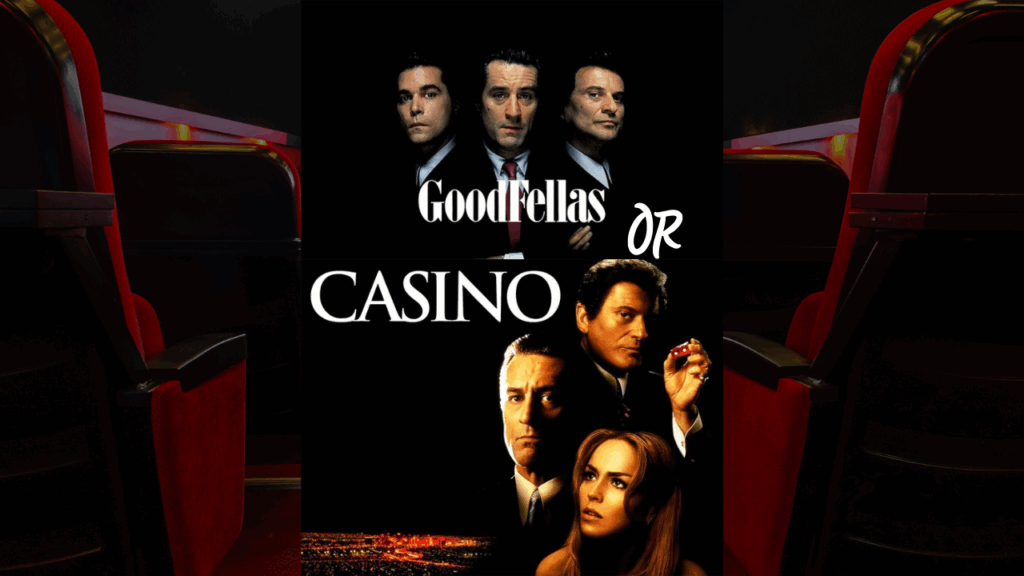Martin Scorsese’s forays into the gritty world of organized crime have produced some of cinema’s most enduring classics. Two standouts, Goodfellas (1990) and Casino (1995), share DNA: both adapted from Nicholas Pileggi’s books, starring Robert De Niro and Joe Pesci, and directed with Scorsese’s signature flair for violence, narration, and rock-infused soundtracks. Yet, fans fiercely debate which is superior. Goodfellas chronicles Henry Hill’s rise and fall in the New York mob, while Casino dives into the glitzy, corrupt underbelly of 1970s Las Vegas. With Goodfellas boasting an IMDb rating of 8.7 from over 1.3 million users and Casino at 8.2 from nearly 600,000, the numbers lean one way, but the argument rages on. Is Goodfellas the groundbreaking blueprint, or does Casino elevate the formula? Let’s debate.
Round 1: Storytelling and Structure – Goodfellas Takes the Lead
Proponents of Goodfellas argue it’s the tighter, more innovative narrative. Based on the real-life exploits of Henry Hill (Ray Liotta), the film zips through decades of mob life with breathless energy. Scorsese’s voice-over technique, delivered by Liotta, pulls viewers into the allure of “the life” – the money, the respect, the thrills – before slamming into its brutal consequences. As one critic notes, Goodfellas excels with its “clever and rousing soundtrack, excellent use of the voice-over technique”, making it feel fresh and immersive. The story’s slice-of-life jumps capture the chaotic unpredictability of crime, from the iconic Copacabana tracking shot to the paranoia-fueled third act.
In contrast, Casino is often called derivative, echoing Goodfellas‘ rise-and-fall arc but stretching it over three hours. Detractors say its pacing drags, with excessive narration from multiple characters feeling redundant. Without Goodfellas‘ success, “there’s probably no Casino,” as one forum user points out, highlighting how the earlier film set the template for Scorsese’s mob sagas. Goodfellas is more accessible, blending humor, horror, and heart into a quotable masterpiece that’s “one of the greatest” mob movies ever. Its story feels personal and propulsive, focusing on Henry’s everyman perspective, making viewers root for – and recoil from – the antihero.
Round 2: Depth and Emotion – Casino Strikes Back
But Casino advocates counter that depth trumps flash. Here, De Niro’s Sam “Ace” Rothstein is a meticulous casino boss whose empire crumbles due to personal flaws and mob entanglements. The film delves into emotional territory Goodfellas skimps on, particularly through Sharon Stone’s Oscar-nominated Ginger, a hustler whose volatility adds tragic heft. Unlike Karen Hill in Goodfellas, whose role is largely reactive, Ginger is a “force” with agency and complexity, elevating the drama. The love triangle between Ace, Ginger, and Pesci’s explosive Nicky Santoro injects raw emotion, exploring betrayal and obsession in ways Goodfellas‘ relationships don’t.
Casino‘s tighter story arc ties events to character decisions, building to a visceral downfall. It’s more operatic, capturing Las Vegas’ unique history – the glamour masking greed and corruption – offering a “fresher take on crime sagas”. While Goodfellas shocks with violence (think Pesci’s “funny how?” scene), Casino uses it thematically, commenting on the inevitable self-destruction of criminals. Performances shine brighter too: De Niro and Pesci’s dynamic evolves with nuance, unlike the static one in Goodfellas. James Woods’ sleazy Lester adds flavor, and Stone’s tour-de-force is hailed as her career best. As one contrarian argues, Casino is like a “finest steak dinner” – substantial and satisfying – versus Goodfellas‘ “sugar rush”.
Round 3: Innovation vs. Refinement – A Split Decision
Goodfellas wins on innovation. It revolutionized gangster films, influencing everything from The Sopranos to Boogie Nights. Its editing, by Thelma Schoonmaker, pulses with life, and the soundtrack – from “Rags to Riches” to Layla’s piano coda – narrates emotionally. Critics praise its “raw depiction of mob life” and “impeccable pacing,” making it endlessly rewatchable. Pesci’s Oscar-winning Tommy DeVito is a powder keg of charisma and menace, outshining his Nicky in Casino.
Yet Casino refines the formula, with a “clearer narrative” and “more complex performances”. Its Vegas setting provides a vibrant canvas, from opulent casinos to desert graves, offering “more to say” about power’s corruption. Though longer, it’s “more fun and over the top” on rewatches, with Scorsese’s style at its most extravagant.
The Verdict: Goodfellas Edges Out, But Both Are Winners
In this debate, Goodfellas emerges victorious for its groundbreaking impact, tighter execution, and cultural resonance. It’s the blueprint that made Casino possible, with a story that’s “better overall” and more entertaining. However, Casino deserves credit for its emotional layers and bold ambition, proving Scorsese’s evolution. Ultimately, the “better” film depends on taste: thrill-seekers pick Goodfellas, depth-divers choose Casino. Watch both – Scorsese’s mob world is big enough for two kings.

